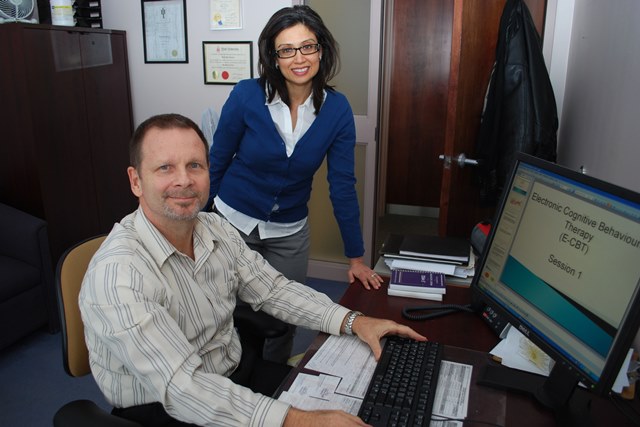
#Mental Health Services at The Scarborough Hospital (TSH) is embarking on an innovative research project that uses modern technology to deliver Cognitive Behavioural Therapy (CBT) to some of its Outpatient Program clients.
CBT is a widely used form of psychotherapy in the treatment of anxiety and depression. Demand exceeds supply, however, especially with long wait lists, a shortage of therapists and a lack of access to a therapist beyond regular business hours. Also, many clients suffering from symptoms of depression or anxiety are resistant to taking part in group psychotherapy, a core aspect of CBT.
This is where technology comes in – using the internet to provide CBT online to certain outpatient clients.
MORE: ACETAMINOPHEN: WHAT YOU NEED TO KNOW
“The world of psychiatry has shifted, and we’re less pill-based now,” explains TSH Psychiatrist Dr. David Gratzer. “Major studies show the vast majority of people with mild or moderate depression respond as well on medications as they do therapy, particularly CBT. And, people with moderate depression actually do better with both medication and CBT.”
Given the barriers some clients face in participating in CBT, the search was on for other forms of delivering this type of therapy.
“We want to offer something where our clients could continue their daily work, family or school obligations and still do CBT on their own time, at their own pace,” explains Faiza Khalid-Khan, TSH Patient Care Manager, TSH’s Inpatient and Outpatient Mental Health.
Dr. Gratzer’s search paid off.
MORE: BLOOD TEST CAN PREDICT ALZHEIMER’S DISEASE
“A young physician at Queen’s University in Kingston presented a paper at a conference of the American Psychiatric Association about the growing use of internet-assisted CBT,” Dr. Gratzer explains. “We were astonished at how much work has been done in this area – not just with depression and anxiety, but for people with physical conditions – chronic pain, for instance. We learned some people actually do better with online CBT than with individual or group therapy.”
Internet-assisted CBT, or iCBT for short, is gaining in popularity around the world, but has yet to catch on in a big way in North America’s public sector.
Here’s how it works: Using the same modules as face-to-face versions (but adapted for email), TSH’s team – two Registered Nurses, one Psychology Associate and one Social Worker – emails one module per week to outpatient clients, who can complete the modules on their own time, emailing the completed modules by the end of the week. The therapist then blocks off time to review the work.
“This is when the therapy kicks in,” Faiza explains. “The therapist provides feedback, encouragement, acknowledgement, explores coping skills and suggests ways to do things better – just as they would in a group session.
“There’s no impact on staffing, no cost attached to this. It’s one way of getting help to those who might otherwise fall through the cracks.”
It’s not just mental health clients who can benefit from online therapy. Dr. Gratzer envisions its use for other patients. “As people go through what is perhaps the most trying moment of their lives – fighting cancer, for instance – if they have mood and anxiety symptoms, they could be given an iPad and go through some of the exercises while getting their chemotherapy. How perfect is that?” adds Dr. Gratzer. “We can now offer evidence-based therapy that goes beyond the traditional ‘bricks and mortar’ approach.”
The research project aims to enrol at least 40 outpatient clients to participate in iCBT. For one client, it’s an excellent opportunity to access therapy without the inconvenience of physically attending group or individual therapy. “This is something new, and it sounds really interesting,” the client says. “I am so busy with classes at college that it would be hard for me to come in during the day, so I would like to try this.”

